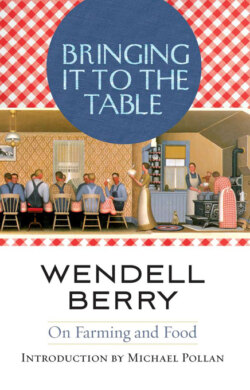Читать книгу Bringing It to the Table - Wendell Berry - Страница 10
На сайте Литреса книга снята с продажи.
II. FACTORY FARMS VERSUS FARMS
ОглавлениеFACTORY FARMS INCREASE and concentrate the ecological risks of food production. This is a well-documented matter of fact. The rivers and estuaries of North Carolina, to use only one example, testify to how quickly a “private” animal factory can become an ecological catas-to trophe and a public liability.
A farm, on the other hand, disperses the ecological risks involved in food production. A good farm not only disperses these risks, but also minimizes them. On a good farm, ecological responsibility is inherent in proper methodologies of land management, and in correct balances between animals and acres, production and carrying capacity. A good farm does not put at risk the healthfulness of the land, the water, and the air.
The ecological differences between a factory farm and a farm may be paramount in a time of rapidly accelerating destruction of the natural world. But there is also an economic difference that, from the standpoint of human communities, is critical.
A factory farm locks the farmer in at the bottom of a corporate hierarchy. In return for the assumption of great economic and other risks, the farmer is permitted to participate minimally in the industry’s earnings. In return, moreover, for the security of a contract with the corporation, the farmer gives up the farm’s diversity and versatility, reducing it to a specialist operation with one use.
According to one company’s projections, a farmer would buy into the broiler business at a cost of $624,275. That would be for four houses that would produce 506,000 birds per year. Under the company’s terms, this investment would produce a yearly net income of $23,762. That would be an annual return on investment of 3.8 percent.
I don’t know what percentage of annual return this company’s share-holders expect to realize from their investment. I do know that if it is not substantially better than the farmer’s percentage, they would be well advised to sell out and invest elsewhere.
The factory farm, rather than serving the farm family and the local community, is an economic siphon, sucking value out of the local landscape and the local community into distant bank accounts.
To entice them to buy Kentuckians’ work and products so cheaply, our state government has given the animal confinement corporations some $200 million in state and federal tax “incentives.” In gratitude for these gifts, these corporations now wish to be relieved of any mandated public liability or responsibility for their activities here.
I don’t know that the arrogance and impudence of this have been equaled by any other industry. For not only have these people demonstrated, by their contempt for laws and regulations here and elsewhere, their intention to be bad neighbors; they come repeatedly before our elected representatives to ask for special exemptions. But in that very request they acknowledge the great risks and dangers that are involved in their way of doing business. Why should the innocent, why should people with a good conscience, want to be exempt from liability?
It is clear that the advocates of factory farming are not advocates of farming. They do not speak for farmers.
What they support is state-sponsored colonialism—government of, by, and for the corporations.
